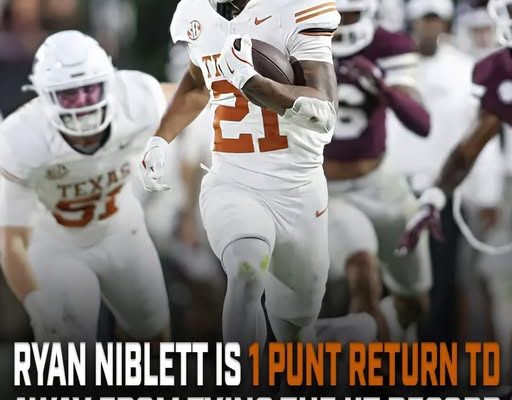We’re living in a time where Lane Kiffin has become the most sought-after name in the coaching carousel, and that statement alone speaks volumes about how far both he and the college football landscape have come. What once felt like a chaotic, unpredictable coaching journey has now transformed into a masterclass in reinvention. Kiffin, once branded as college football’s enfant terrible, has matured into one of the sport’s sharpest minds — a tactician whose blend of offensive innovation, player empowerment, and charisma has captivated fans and athletic directors alike. Every time a major coaching vacancy opens, his name immediately floats to the top of the rumor mill, not because of hype or nostalgia, but because of results. Lane Kiffin has finally arrived as the complete package — and the entire sport seems to know it.
For years, the Lane Kiffin story was one of promise, missteps, and redemption. He first burst onto the national stage as the young, brash head coach of the Oakland Raiders at just 31 years old, the youngest in NFL history at the time. It was an audacious leap that ultimately ended in public dysfunction and his firing after just 20 games. But even then, people inside the game could see the seeds of brilliance — a mind obsessed with offense, tempo, and play design. What Kiffin lacked in polish and leadership at the time, he made up for in creativity and fearlessness. His journey back through college football, from Tennessee to USC to Alabama, and now at Ole Miss, reads like a rollercoaster. Yet through it all, one thing remained constant: Kiffin’s ability to adapt, evolve, and win.
Fast forward to today, and the perception of Kiffin has shifted dramatically. No longer the impulsive young coach trying to prove himself, he’s now regarded as one of the most strategically gifted and emotionally intelligent leaders in the game. His work at Ole Miss has been nothing short of transformative. He took a program that had fallen into mediocrity and injected it with life, energy, and identity. The Rebels play with confidence and swagger, but also with discipline and purpose — two qualities that once eluded Kiffin’s earlier teams. His ability to connect with players, embrace analytics, and manage modern recruiting landscapes has made him a prototype for the modern college football coach.
The fascination with Kiffin isn’t just about his wins and losses. It’s about the aura — that combination of authenticity, humor, and insight that makes him both unpredictable and relatable. In an era when so many coaches come across as robotic or overly rehearsed, Kiffin is disarmingly real. He tweets memes. He pokes fun at himself. He calls out media narratives with a wink and a grin. And yet, beneath the personality, there’s a deeply analytical coach who spends countless hours breaking down defenses, perfecting play-calling sequences, and finding the slightest competitive edges. The juxtaposition between his online persona and his behind-the-scenes intensity makes him one of the sport’s most fascinating figures.
Perhaps what has truly cemented Kiffin as the most sought-after name in coaching circles, though, is his proven ability to evolve with the times. Football, especially at the college level, has changed dramatically in the past decade. The rise of the transfer portal, NIL (Name, Image, and Likeness) opportunities, and the rapid spread of offensive innovation have rewritten the rules of engagement. Many traditional coaches have struggled to keep up, clinging to outdated philosophies or rigid systems. Kiffin, by contrast, has thrived in the chaos. He embraces change. He encourages players to capitalize on NIL deals. He openly recruits from the portal with transparency and confidence. He has built an entire culture around adaptability — and in today’s volatile college football environment, that’s invaluable.
There’s also a tactical brilliance that cannot be overlooked. Offensively, Kiffin has long been one of the most creative play-callers in the sport. His ability to marry tempo with precision, to blend pro-style concepts with spread formations, and to tailor his offense around his personnel rather than forcing a system on them — that’s what separates him from many of his peers. Watch an Ole Miss game closely, and you’ll see an offense that flows like jazz — structured, yet spontaneous; calculated, yet free. Kiffin’s fingerprints are all over every play, from the pre-snap motion to the post-snap reads. And his quarterbacks, whether it was Matt Corral or Jaxson Dart, consistently play with confidence and clarity because they know their coach trusts them completely.
That trust may be the most significant evolution in Kiffin’s career. Early on, he was known as a control-oriented coach who wanted everything to run exactly as scripted. But as he’s grown, he’s learned that the best coaches aren’t dictators — they’re collaborators. His players talk about how Kiffin empowers them to make adjustments, to take ownership of the game plan, and to express themselves on the field. It’s a level of player autonomy that resonates deeply with today’s athletes, who value relationships and authenticity as much as they do results. That human touch, combined with Kiffin’s tactical acumen, makes him an irresistible figure for any program seeking not just a coach, but a culture-changer.
And make no mistake — the demand for Lane Kiffin is real. Every time a high-profile program finds itself in turmoil, Kiffin’s name is whispered in athletic department hallways. Schools crave what he brings: instant offensive credibility, recruiting energy, and a sense of relevance. He’s the kind of hire that can electrify a fan base overnight. And yet, part of the intrigue is that Kiffin himself seems genuinely content at Ole Miss, building something sustainable rather than simply chasing the next opportunity. That maturity — the willingness to stay and grow rather than jump at every new job — has only increased his value. He’s become the rare coach who could leave if he wanted to, but doesn’t have to. That balance of leverage and loyalty makes him even more appealing.
Beyond the X’s and O’s, beyond the social media moments and the viral quotes, Lane Kiffin represents something larger: the evolution of the modern college football coach. He’s proof that second (and third) chances can lead to greatness, that reinvention is possible even in a sport that’s often unforgiving. His journey mirrors the transformation of college football itself — from rigid hierarchies and tradition-bound systems to a fluid, fast-moving environment driven by creativity, technology, and personality. In many ways, Kiffin embodies the future of the game.
It’s not just about his offensive playbook or recruiting strategies; it’s about his worldview. He understands the psychology of today’s players, the dynamics of social media, and the business realities of college sports. He treats players like adults, respects their voices, and uses humor as a bridge rather than a weapon. He’s the rare coach who can deliver a cutting-edge game plan and a meme-worthy postgame tweet within the same afternoon. And that balance — of intellect and personality, innovation and humility — is exactly what makes him such a coveted figure in the modern era.
For fans, the rise of Lane Kiffin is something of a redemption story they can root for. It’s a reminder that growth is real, that people can evolve, and that sometimes the very traits that once caused turbulence — confidence, boldness, irreverence — can, when refined, become sources of strength. His journey from the chaos of early coaching stints to the calm authority of his Ole Miss tenure is both inspiring and instructive. He’s not running from his past anymore; he’s learned from it, built on it, and turned it into something powerful.
So yes, we’re living in a time where Lane Kiffin is the most sought-after name in the coaching carousel. But maybe that’s not a surprise anymore. Maybe it’s the natural outcome of a career defined by growth, intelligence, and adaptability. He’s no longer the headline-grabbing firebrand or the prodigy who flamed out too soon. He’s the seasoned strategist, the players’ coach, the innovator who never stops evolving. And in a sport that’s constantly searching for the next big thing, Lane Kiffin might just be the rare figure who’s both the present and the future — a man who has turned his own reinvention into a blueprint for modern success.
At the end of the day, Kiffin’s story is about more than football. It’s about redemption, resilience, and relevance. It’s about a coach who learned to laugh at himself, to trust his instincts, and to lead with both intelligence and heart. That’s why every program with ambition looks his way when the coaching carousel starts to spin. Because Lane Kiffin isn’t just winning games anymore — he’s redefining what it means to be a college football coach in the 21st century. And for the first time in his long, winding journey, the sport isn’t laughing or doubting. It’s watching — and waiting — to see what Lane Kiffin does next.



